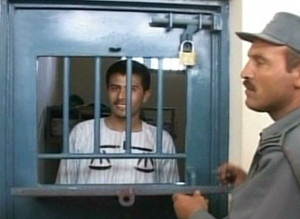Days before the Afghan presidential elections, journalists from thirteen provinces in Afghanistan have told Amnesty International that they had recently been threatened by Afghan government officials because of their critical reporting.
At the same time, the Taliban and other anti-government groups have also stepped up attacks against journalists and blocked nearly all reporting from areas under their control.

RAWA: Despite international condemnation of Parwez Kambakhsh’s case, he was sentenced to 20 years in jail.
RAWA's Appeal
“Afghans have made government corruption and failure to implement the rule of law as key aspects of the current election campaign, but some government officials want to respond to criticism by silencing the journalists who monitor government conduct and provide vital information to the voting public,” said Sam Zarifi, Amnesty International’s Asia-Pacific director.
In some cases, government officials have initiated criminal proceedings against journalists for peacefully exercising their freedom of expression and information. In other cases, government forces have even directly attacked journalists. For instance, in July 2009, five journalists were beaten by police officers in Herat for reporting on a public demonstration and police corruption.
One reporter from Ghazni, who did not want to be identified for fear of reprisals, told Amnesty International, “People working on the Karzai election campaign are calling me and other journalists and threatening us if we report on corruption or anything bad that Karzai’s government is doing. Taliban and other groups contact me and threaten me, telling me I must stop writing any positive news stories about the elections because they don’t want people to support the elections. I am caught between these two sides.”
Another journalists from southern Afghanistan who also didn’t want to be named added “If government officials are threatening me, then who do I complain to? I have to self-censor because otherwise I will be killed.”
“Afghan journalists have demonstrated that they are willing to face tremendous challenges in order to give a voice to the Afghan people, but instead of being supported by the government, they are facing increasing pressure from officials,” said Sam Zarifi.
There has been little official effort to investigate murders and physical attacks on journalists. Government institutions - in particular the National Directorate of Security, have attempted to reduce the media's independence.
“President Karzai, and all the presidential candidates, should immediately and publicly commit to defending Afghan journalists, both from the Taliban, but more importantly, from the government itself,” said Sam Zarifi. “It’s vital that the Afghan government upholds the rule of law and its commitment to media freedom by urgently investigating these cases.”
Amnesty International has produced a ten-point action plan calling on the government of Afghanistan to fulfill its international human rights obligations, including upholding the right to freedom of expression and media expression. Amnesty International said that at a time when Afghans are facing increasing insecurity, prioritizing human rights and the rule of law can serve to strengthen stability and security throughout the country. Specifically, Amnesty International called on the Afghan government to:
• Fully and effectively investigate and prosecute all those responsible for attacks on journalists, human rights defenders and others exercising their right to freedom of expression;
• Commit to ensure that no government agencies, and in particular the NDS, violate freedom of expression;
• Introduce legislation facilitating public access to information from governmental institutions.
To view the full ten point action plan click here:
http://www.amnesty.org/en/library/info/ASA11/010/2009
Background
Freedom of expression, which flourished after the fall of the Taliban in 2001, has eroded as a result of increasing threats and attacks by the government and anti-government forces.
The government has improperly prosecuted several journalists on charges of violating religious sensibilities under pressure from the unofficial but highly influential Ulema Council (council of religious scholars). Sayed Parwiz Kambakhsh, Ahmad Ghous Zalmai a journalist and former spokesman for the Attorney General and Mullah Qari Mushtaq were each sentenced to 20 years’ imprisonment for publishing a Dari translation of the Quran without the Arabic text.
Since 2007, Taliban and other anti-government groups have increased attacks against Afghan journalists. The most recent victim was Jawed Ahmad, an Afghan journalist who was gunned down in the southern city of Kandahar in March 2009. On 7 June 2008 Abdul Samad Rohani, an Afghan journalist working for the BBC in Helmand province, was abducted and shot dead the next day, possibly as a result of his investigation of the narcotics trade. In May 2008, Afghan television journalist Nilofar Habibi was stabbed at the doorstep of her home in Herat, apparently for not wearing a burqa. In June 2007, unknown gunmen shot and killed Zakia Zaki, director of the private radio station Radio Peace in Parwan province. She had been critical of local warlords, who had warned her to close the station. In March 2007, the Taliban beheaded journalist Ajmal Naqshbandi and killed his driver Sayed Agha in Helmand province.



